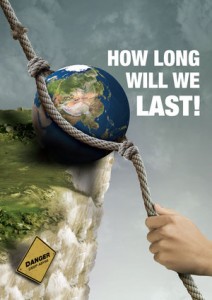Is it possible to quantify the impact that human beings are having on the Earth? It is easy to use words like “huge” or “irreversible” or “catastrophic” but it is actually possible to put a number on it? We can measure the amount of carbon dioxide in terms of parts per million. We can measure the increasing acidity of the oceans. We can guess at the amount of plastic being released into places where it shouldn’t be. But is there a way to quantify the overall impact?
Probably not, although there is a useful equation that allows us to at least examine some of the variables that govern the extent of our impact, hopefully with a view to reducing it. Some of you may well be familiar with the IPAT equation in environmental literature. Its creation is generally attributed to Paul Ehrlich, although according to the Wikipedia page the equation actually emerged from a debate in which Ehrlich was only one of three participants.

I think it’s fairly self-explanatory, but do check out the Wikipedia page for a short-but-good definition. It basically explains that what is happening in terms of human impact is a product of our growing numbers and our increasing affluence. If we were achieving sufficient advances in the efficiency of the technology required to produce this affluence, it’s just possible that we could reduce our overall environmental impact, but at the moment our technology is not advancing fast enough to offset the exponential growth in our population and material consumption.
I first came across the equation in Paul Gilding’s excellent book, The Great Disruption: Why the Climate Crisis Will Bring On the End of Shopping and the Birth of a New World, an ultimately optimistic book in which he foresees the need for a significant environmental crisis that will lead to a Great Awakening, in which the human race will collectively slap itself on the forehead and wonder what the heck it was thinking when it completely messed up its one and only planet. (You can get the 18-minute version of Paul Gilding’s thesis in his TED Talk, The Earth Is Full.)
More recently, a friend sent me the link to a variation on the IPAT, as explained by Ray Anderson in his TED Talk on the business logic of sustainability. A friend of Amory Lovins, founder of the Rocky Mountain Institute, and influenced by Paul Hawken’s business writings, Ray Anderson transformed his carpet business into an eco-responsible business that now aims to have zero impact by 2020.

He first of all rearranged the IPAT equation so that T is divisor rather than multiplier, then revised it again to what he calls “The New Civilisation” so that A becomes a, symbolising decreased emphasis on affluence, and H added into divisor to stand for Happiness (satisfying all human needs)
I = P x a
T2 x H
I’d like to suggest a further refinement, so that W for Wisdom is factored in, although my algebra isn’t quite good enough to be sure where it would go. I think it would be:
I = P x a
T2 x H x W
but please feel free to tell me if I’m wrong!
What are your thoughts? What other variables do you think we can or should introduce to the equation to reduce the environmental impact of humankind? Do you think the formula is helpful, or does it just tell us what we already knew without offering solutions? Please post a comment and let me know!
Back to that “H” – there is also a formula for defining happiness. H = S + C + V, where:
H = your enduring level of happiness
S = your biological set point
C = conditions of your life
V = your voluntary activities
Trying to incorporate that into the IPAT formula truly does defeat my algebraic abilities, but it might be fun to discuss the Happiness Formula separately in a future Philosophy Friday. Yes?

In thinking about sustainability and plastics (challenge: what do I do with all my yogurt cartons – maybe put holes in the bottom and use them to start plants) it’s important to ensure people also have financially sustainable lives.
Here’s a simple formula from Charles Dickens’ Mr Mcawber in David Copperfield “Annual income twenty pounds, annual expenditure nineteen six, result happiness. Annual income twenty pounds, annual expenditure twenty pound ought and six, result misery.”
Well said, Charles Dickens. This is one aspect of my own life that still remains to be figured out. I certainly didn’t go into eco campaigning for the money!
Ray Anderson’s TED talk is excellent. Ray was a truly enlightened industrialist. We need more business leaders to move from “plunderer of the earth” to “recovering plunder.”
Mr. Anderson’s modified equation was I = (P x a) / (T2 x H)
which he clearly explains here http://bit.ly/RayTED2009
I like your suggestion I = (P x a) / (T2 x H x W) , where W = Wisdom
If I am understanding the intention of your suggestion, increasing wisdom implies cognizance of the inter-relatedness of all aspects of society and impact one element has on others; understanding the system as a whole. I agree that wisdom applies to individuals as well as to institutions and society as a whole — the way we perceive “success” or “good.”
I’m thinking there might also be room for a similar but more specific human variable “CCC”:
I = (P x a) / (T2 x H x W x CCC) , where CCC = Community Connections and Consciousness
CCC is more about personal human relationships. My thought is that the more we are individually connected with our local community, the less negative impact we will have as a result of our raised awareness of the impacts on others of what we do. Just being conscious of how our actions affect others influences what we do, e.g., acts as small as dropping a candy wrapper or a cigarette butt on the ground which seem inconsequential, to very large actions which have more obvious ramifications. Nice photo of you, Paul and Sedna. We were all “younger” then.
Hi Doug, really excellent suggestion. I like it! It is our loss of the sense of interconnection – with each other and with our earth – that underlies so many of our problems.
No matter how much we try to quantify the causes and effects, if we have little (or no) sense of connection and interconnection–with our Earth and fellow earthlings–our destruction of our home will continue. One does not destroy what one cares about (has a connection to).
That’s why it is so important to find ways of connecting people to one another and the planet. Your efforts are a part of that, so are Doug’s, and mine, but we absolutely must reach a critical mass of connectivity (to one another and the Earth) soon!
You are so right, Cynthia! And I think we’re getting closer….
Very good! Keep fighting the good fight . . .
Isn’t big government the source of all environmental problems ?
In my view, it’s really important to see that corporations and individual consumers also have to take a lot of responsibility for the present issues.
It occurs to me that big Government and Corporations would not exist without human beings.
Affluence=Effluence?
Many of the worlds religions teach the principle of interconnectedness and interdependence and they have been around for a very long time. Muslim, Buddist, Chrisitian and Indigenous peoples all around the World. I wonder why we do not hear the voices of the people who practice and believe in these religions? Could it be the chatter of our Monkey Minds? No offense intended to Monkeys. I like the principle of Gross National Happiness from the people of Bhutan. It fits well with Roz and Unca Doug’s comments above. Also the idea of a butterfly’s wings having an effect on the weather around the world. So glad to see another Philosophy Friday. Thanks Roz.